Texas Governor Greg Abbott has moved forward with legal efforts to hold Democratic lawmakers accountable after they fled the state in protest of Republican-led redistricting efforts.
The Texas Supreme Court has now ordered Democratic State Representative Gene Wu, a central figure in the walkout, to formally respond to the governor’s legal action.
Today I took emergency action to begin the removal from office of derelict Democrat Texas House members who refuse to show up for the special session. pic.twitter.com/VLpwhfJLQb
— Greg Abbott (@GregAbbott_TX) August 5, 2025
Trump’s Sovereign Wealth Fund: What Could It Mean For Your Money?
The controversy stems from a renewed push by the Texas legislature to pass new redistricting maps.
In response, several Democratic legislators left the state to prevent the Republican-controlled House from reaching the quorum necessary to conduct legislative business.
The move effectively stalled legislative action in Austin and has now resulted in potential legal consequences.
This Could Be the Most Important Video Gun Owners Watch All Year
Governor Abbott’s legal filing seeks to challenge the Democrats’ decision to abandon their legislative duties.
Fleeing the state to avoid doing the job voters elected you to do? That’s not leadership.
The derelict Democrats will face consequences. pic.twitter.com/eiPWv9Y6q7
— Greg Abbott (@GregAbbott_TX) August 6, 2025
The Texas Supreme Court’s directive to Rep. Wu marks the latest development in an ongoing standoff over the redistricting process. The Court has not yet announced a timeline for a final ruling on the matter.
While the legislative impasse continues, other state issues remain unresolved, including responses to recent flooding and other critical matters requiring legislative attention.
The walkout has drawn criticism from those who argue the legislators’ absence is hindering necessary governance.
The debate over redistricting has also spilled into the national political scene.
California Governor Gavin Newsom weighed in on the matter with a post on X, where he listed red states with zero or just one Democratic House representative.
Newsom posted:
“Red states with ZERO Dem house seats:
Oklahoma
Arkansas
Iowa
Utah
Nebraska
Idaho
Montana
West Virginia
Alaska
North Dakota
South Dakota
Wyoming
Red states with just ONE Dem house seat:
Mississippi
South Carolina
Tennessee
Kentucky
Kansas
Should I keep going?”
Oh cool I can do that too.
Red states with ZERO Dem house seats:
Oklahoma
Arkansas
Iowa
Utah
Nebraska
Idaho
Montana
West Virginia
Alaska
North Dakota
South Dakota
WyomingRed states with just ONE Dem house seat:
Mississippi
South Carolina
Tennessee
Kentucky… https://t.co/OHjtq3w3bQ— Gavin Newsom (@GavinNewsom) August 5, 2025
Newsom’s post was widely circulated online, but quickly drew mockery for failing to acknowledge that several of the states he listed—North Dakota, South Dakota, Wyoming, and Alaska—only have one congressional district each due to population size.
Critics pointed out that it would be impossible to gerrymander these single-member states in the way Newsom implied.
White House Deputy Press Secretary Abigail Jackson responded to the post, suggesting disbelief at the oversight.
Are… are you seriously saying Wyoming is gerrymandered? Because it literally has 1 congressional seat. https://t.co/WolHF8m80S
— Abigail Jackson 🇺🇸 (@abigailmarone) August 6, 2025
CNN commentator Scott Jennings also weighed in sarcastically, writing, “Trump is truly blessed by the dumbest opposition. ”
Lol Gavin has the Dakotas & Wyoming on here – with one seat each – as being gerrymandered. Trump is truly blessed by the dumbest opposition. 😂 https://t.co/SIzp65WJCb
— Scott Jennings (@ScottJenningsKY) August 5, 2025
Newsom has previously signaled he may take retaliatory steps in California if Texas proceeds with the redistricting plans.
However, critics have pointed to his own political record in California as evidence of partisan redistricting and have questioned the logic of retaliatory action from a state with its own redistricting controversies.
While the situation in Texas continues to evolve, the broader redistricting debate is drawing attention from national figures and prompting renewed scrutiny of state-level political maneuvers heading into the next round of elections.
The outcome of the legal challenge in Texas could have wider implications for future quorum disputes and legislative walkouts in other states.
Read the full article here












